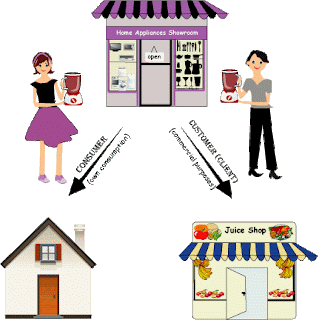A consumer and customer are commonly used in the same context at times in business literature. However, they are not the same. Consumers are just one sub group of customers. Consider this example with the Philips company. If a restaurant buys a Philips mixie (blender) for making juice to serve its patrons, then the restaurant is just a customer and NOT a consumer. But if you go and buy a Philips mixie to make juice for your children at home, you are a consumer.
What does this example mean? It means that if you buy a product for any commercial purposes you are not a consumer. If you buy a product purely for your own consumption, you are a consumer.
The consumer protection act 1986 of India, is a little more generous with the word 'Consumer'. According to this law, consumer is not only a person who uses the product for domestic personal use, but also one who uses the product to earn his daily livelyhood. So if your restaurant is a propreitorship company, you are the sole propreitor and the purchase of the mixie is in your name, then you could be deemed a consumer according to the consumer protection act 1986.
There are organizations that call customers who buy products for personal use 'consumers' and customer who buy products for commercial use 'clients'. In short, there are two categories of customers based on how they intent to use the product; consumers and clients
Obviously, consumer protection act 1986 provides protection only for consumers. If you think about it, buying a product for commercial purposes is a business transaction as you have no intention to consume the product for personal use. Like any other business transactions that goes sore, contractual law / civil legislation / arbitration clauses should guide how disputes are resolved. Summarily, consumer protection is only for consumers. You cannot go to a consumer disputes redressal forum (consumer court) if a business transaction goes sour.
The consumer protection act 1986 is further expansive of the term consumer. You dont necessarily have to buy a product for personal use to be a consumer. Just the intention makes you a consumer. In other words, you are a consumer if you intent to buy the product
Lets consider the following as an example. Say a consumer walked into a shop, and tried to buy a product with a maximum retail price (MRP) of Rs.30/-. However, just as the consumer is about to pay, he realizes that the seller wants to charge him Rs.35/-. The consumer refuses to buy the product and walks off without buying the product. Can such a consumer seek protection as per the provisions of consumer protection act? The answer is Yes. As a consumer, it is your right not to be overcharged more than the MRP.
Consider another example. A consumer observes a newspaper advertisement claiming a TV has a specific feature. The consumer visits the TV dealer to buy the TV. However, while discussing the product, the consumer notices that the TV doesnt have the advertised feature. The consumer therefore walks off without buying the TV. Can such a consumer seek protection as per the provisions of consumer protection act? The answer is again a resounding Yes. As a consumer, it is your right not to be misinformed about any products capability.
But sadly, the chances that you as a consumer will ever win a case in the first example is slim to none. Since you refused to purchase the product, you have no proof that the shopkeeper tried to charge you Rs.35/-. In the second case, you stand a good chance of winning a case if you have a certified copy of the newspaper advertisement claiming the product feature and any product literature that shows the lack of availability of the feature.
Now what does winning as a consumer mean in the second case. Since you have not bought the TV, it is hard to prove any damages. You can try to get punitive damages against the company for trying to defraud you as a consumer. However, this is not something to bet on. Your relief as a consumer is that you can request the consumer court to order the company to correct the advertisement, or withdraw the product with such claims. You are very likely to win the former relief, the latter again is uncertain.
The larger question is, to obtain such a relief, should you as a consumer approach a consumer court staking your financial resources, or should there be an effective government (sigh!) watchdog consumer agency that should resort to action on your behalf? This has been a question that has been the core of consumer issues in this country for the last quarter century since the inductment of consumer protection act 1986. It also throws light on the deficiencies of consumer protection act in India.
If you want to check out your ability to distinguish a consumer as per the provisions of the consumer protection act, try to quiz below and see if you pass.
Source: consumerdaddy.com





0 comments:
Post a Comment